Vocational education Universal Technical Institute (NYSE:UTI) reported Q1 FY2024 results exceeding Wall Street analysts' expectations, with revenue up 45.6% year on year to $174.7 million. The company's full-year revenue guidance of $715 million at the midpoint also came in slightly above analysts' estimates. It made a GAAP profit of $0.17 per share, improving from its profit of $0.02 per share in the same quarter last year.
Universal Technical Institute (UTI) Q1 FY2024 Highlights:
- Revenue: $174.7 million vs analyst estimates of $168.3 million (3.8% beat)
- EPS: $0.17 vs analyst estimates of $0.04 ($0.13 beat)
- Raised full year 2024 guidance at the midpoint for revenue, adjusted EBITDA, and adjusted EPS
- Free Cash Flow of $6.99 million, down 84.8% from the previous quarter
- Gross Margin (GAAP): 47.1%, down from 56.7% in the same quarter last year
- New Students: 4,346
- Market Capitalization: $791.5 million
Founded in 1965, Universal Technical Institute (NYSE: UTI) is a leading provider of technical training programs, specializing in automotive, diesel, collision repair, motorcycle, and marine technicians.
UTI offers industry-aligned curricula and a hands-on training approach. The institute collaborates with some of the biggest names in the automotive and manufacturing sectors, such as Ford, BMW, and Harley-Davidson, to ensure that the training and education provided are aligned with industry needs and technological advancements.
The programs offered at UTI cover a range of transportation-related fields, and students pay tuition to enroll in its courses. In automotive, students are trained in vehicle repair and maintenance, including engine diagnostics, drivability, and electronic systems. The diesel technician training involves learning about large vehicles and engines, focusing on fuel systems, hydraulics, and power generators. Additionally, UTI offers specialized programs in collision repair, welding, CNC machining, and marine technology.
In addition to its core programs, UTI has expanded its offerings to include Manufacturer-Specific Advanced Training (MSAT) programs. These specialized courses are designed to provide advanced training in specific brands and technologies to give students an edge in the highly competitive job market.
One of UTI’s focuses is on career readiness. Its Career Services department actively assists students and graduates in finding employment opportunities, utilizing UTI's extensive network of industry contacts. This includes job placement assistance, resume building, and interview preparation.
Education Services
A whole industry has emerged to address the problem of rising education costs, offering consumers alternatives to traditional education paths such as four-year colleges. These alternative paths, which may include online courses or flexible schedules, make education more accessible to those with work or child-rearing obligations. However, some have run into issues around the value of the degrees and certifications they provide and whether customers are getting a good deal. Those who don’t prove their value could struggle to retain students, or even worse, invite the heavy hand of regulation.
Universal Technical Institute’s primary competitors include Lincoln Educational Services (NASDAQ:LINC), Adtalem Global Education (NYSE:ATGE), Strategic Education (NASDAQ:STRA), Chegg (NYSE:CHGG), and private companies WyoTech and Ohio Technical College.Sales Growth
A company’s long-term performance can give signals about its business quality. Even a bad business can shine for one or two quarters, but a top-tier one may grow for years. Universal Technical Institute's annualized revenue growth rate of 16.1% over the last 5 years was solid for a consumer discretionary business. 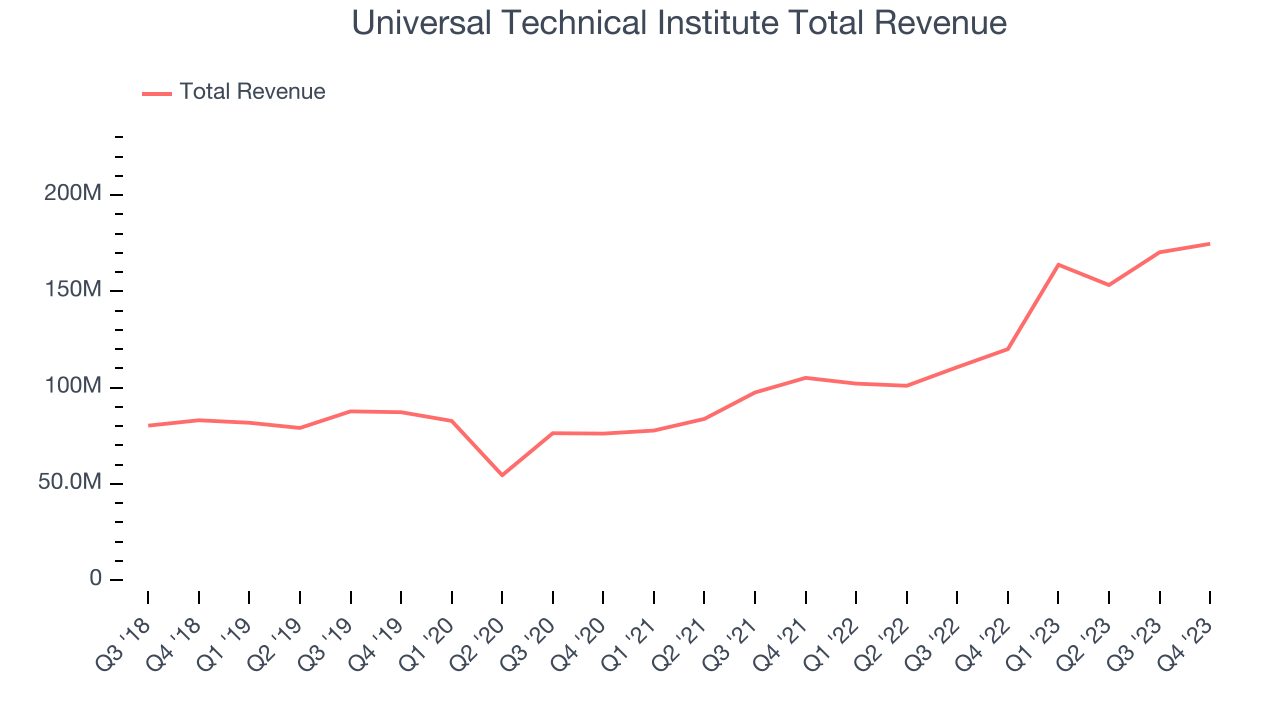 Within consumer discretionary, a long-term historical view may miss a company riding a successful new product or emerging trend. That's why we also follow short-term performance. Universal Technical Institute's healthy annualized revenue growth of 34.9% over the last 2 years is above its 5-year trend, suggesting its brand resonates with consumers.
Within consumer discretionary, a long-term historical view may miss a company riding a successful new product or emerging trend. That's why we also follow short-term performance. Universal Technical Institute's healthy annualized revenue growth of 34.9% over the last 2 years is above its 5-year trend, suggesting its brand resonates with consumers.
We can understand the company's revenue dynamics even better by analyzing its number of New Students, which reached 4,346 in the latest quarter. Over the last 2 years, Universal Technical Institute's New Students averaged 45.8% year-on-year growth. Because this number is higher than its revenue growth during the same period, we can see the company's average selling price has fallen. 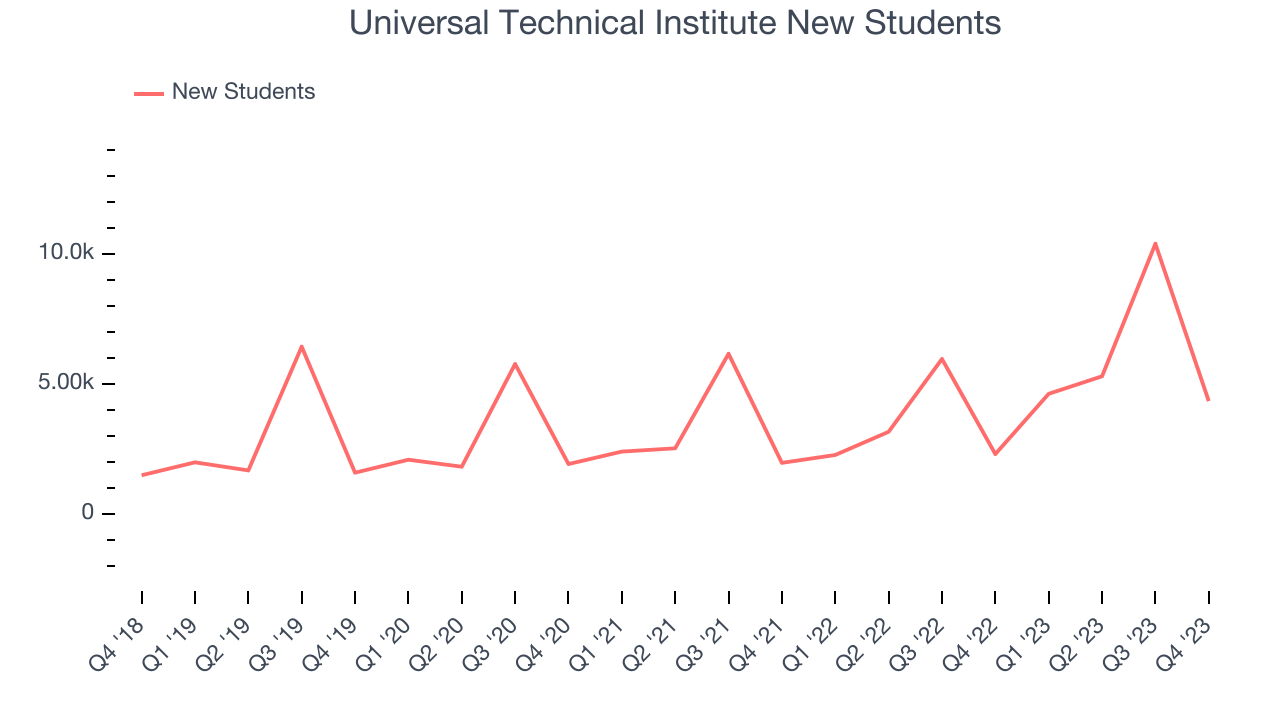
This quarter, Universal Technical Institute reported magnificent year-on-year revenue growth of 45.6%, and its $174.7 million of revenue beat Wall Street's estimates by 3.8%. Looking ahead, Wall Street expects sales to grow 8.4% over the next 12 months, a deceleration from this quarter.
Operating Margin
Operating margin is a key measure of profitability. Think of it as net income–the bottom line–excluding the impact of taxes and interest on debt, which are less connected to business fundamentals.
Universal Technical Institute was profitable over the last two years but held back by its large expense base. Its average operating margin of 3.8% has been paltry for a consumer discretionary business.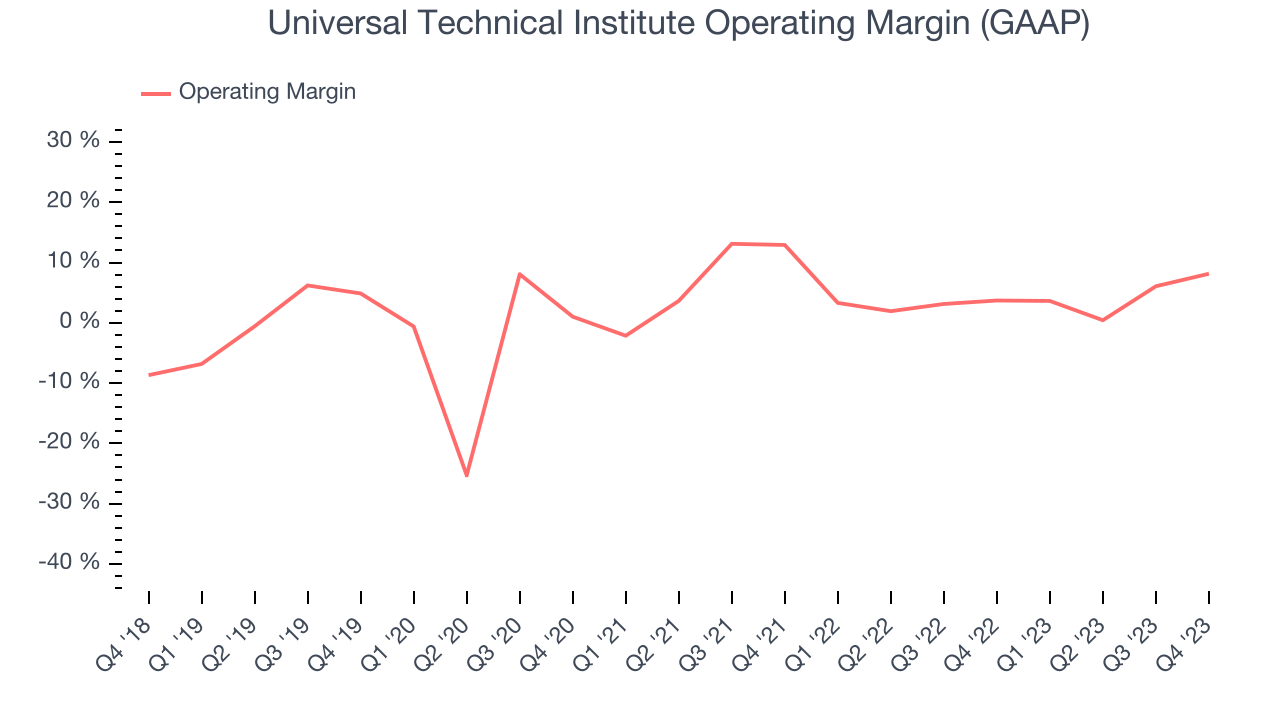
In Q1, Universal Technical Institute generated an operating profit margin of 8.1%, up 4.4 percentage points year on year. This increase indicates the company was more efficient with its expenses over the last quarter, spending less money in areas like corporate overhead and advertising.
Over the next 12 months, Wall Street expects Universal Technical Institute to become more profitable. Analysts are expecting the company’s LTM operating margin of 4.7% to rise to 7.8%.EPS
We track long-term historical earnings per share (EPS) growth for the same reason as long-term revenue growth. Compared to revenue, however, EPS highlights whether a company's growth was profitable. 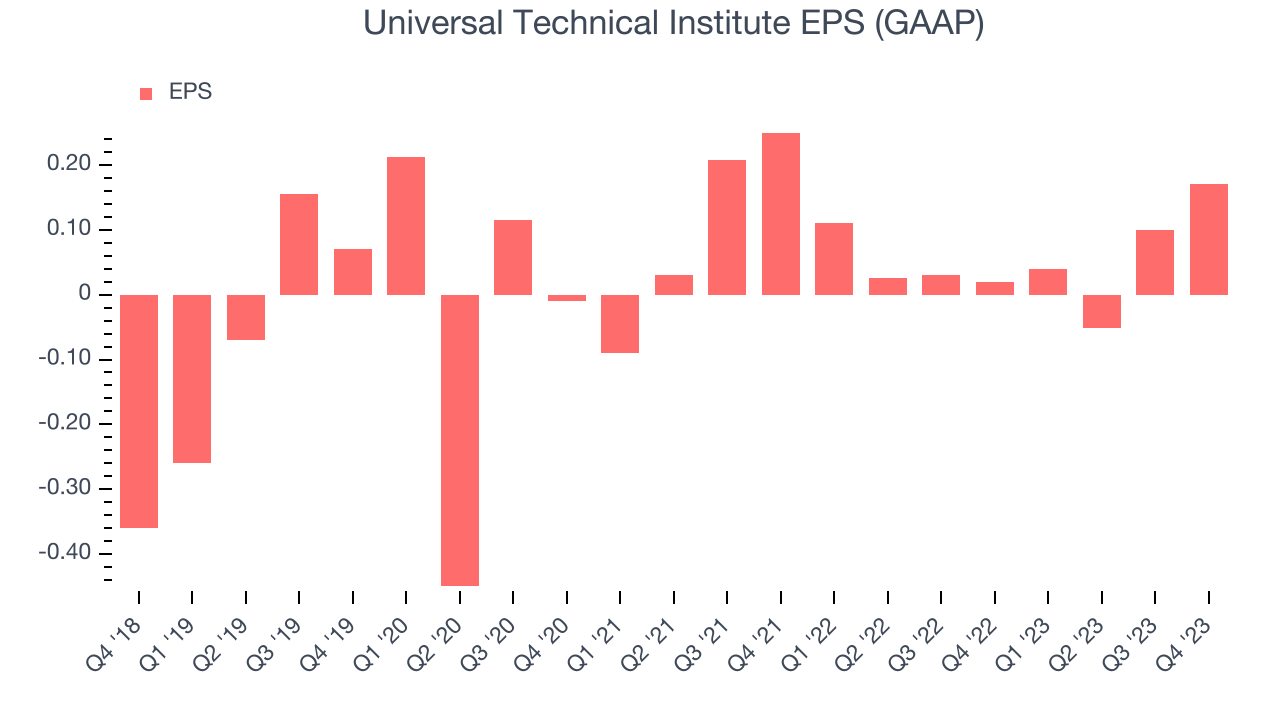
Over the last 5 years, Universal Technical Institute cut its earnings losses and improved its EPS by 18.3% on average each year. This performance is higher than its 16.1% annualized revenue growth over the same period. Let's dig into why.
Universal Technical Institute's operating margin has expanded 16.8 percentage points over the last 5 years, leading to higher profitability and earnings. Taxes and interest expenses can also affect EPS growth, but they don't tell us as much about a company's fundamentals.In Q1, Universal Technical Institute reported EPS at $0.17, up from $0.02 in the same quarter a year ago. This print easily cleared analysts' estimates, and shareholders should be content with the results. Over the next 12 months, Wall Street expects Universal Technical Institute to grow its earnings. Analysts are projecting its LTM EPS of $0.26 to climb by 153% to $0.65.
Cash Is King
Although earnings are undoubtedly valuable for assessing company performance, we believe cash is king because you can't use accounting profits to pay the bills.
While Universal Technical Institute posted positive free cash flow this quarter, the broader story hasn't been so clean. Over the last two years, Universal Technical Institute's demanding reinvestments to stay relevant with consumers have drained company resources. Its free cash flow margin has been among the worst in the consumer discretionary sector, averaging negative 3.7%.
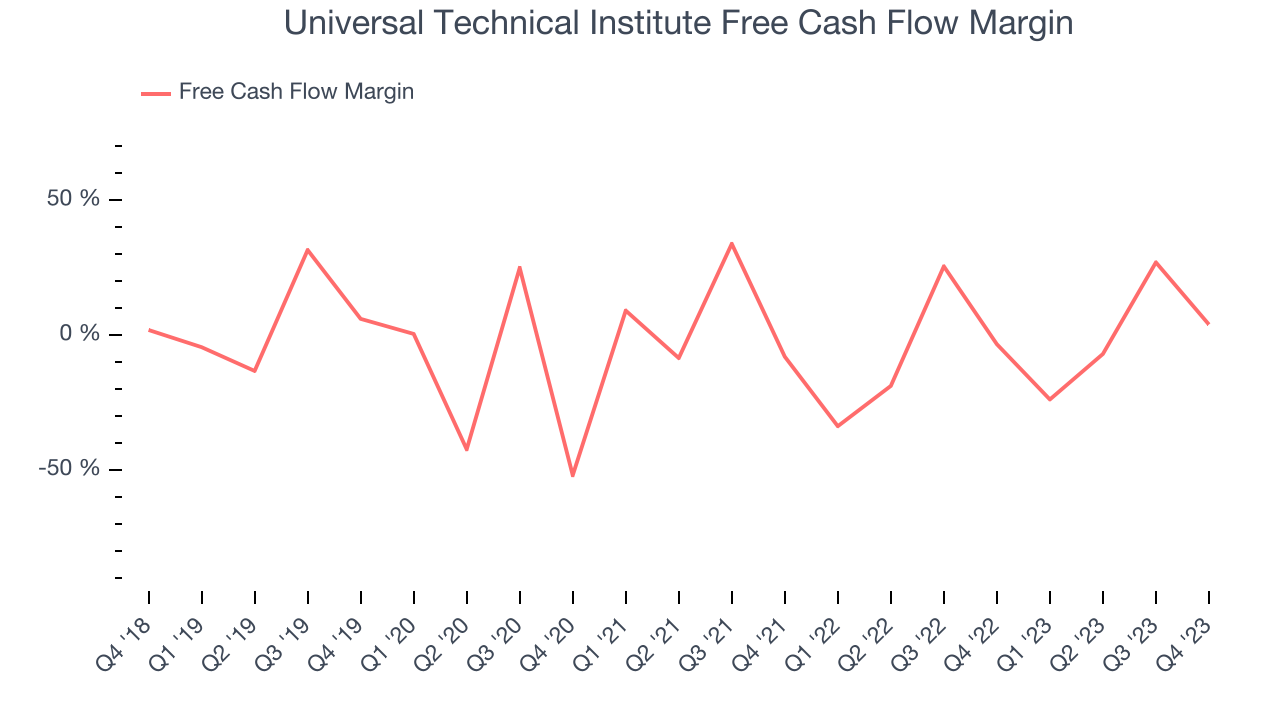
Universal Technical Institute's free cash flow came in at $6.99 million in Q1, equivalent to a 4% margin. This result was great for the business as it flipped from cash flow negative in the same quarter last year to positive this quarter. Over the next year, analysts predict Universal Technical Institute's cash profitability will improve. Their consensus estimates imply its LTM free cash flow margin of 0.5% will increase to 6.7%.
Return on Invested Capital (ROIC)
EPS and free cash flow tell us whether a company was profitable while growing revenue. But was it capital-efficient? Enter ROIC, a metric showing how much operating profit a company generates relative to how much money the business raised (debt and equity).
Universal Technical Institute's five-year average return on invested capital was 8.6%, somewhat low compared to the best consumer discretionary companies that pump out 25%+. Its returns suggest it historically did a subpar job investing in profitable business initiatives.
The trend in its ROIC, however, is often what surprises the market and drives the stock price. Over the last two years, Universal Technical Institute's ROIC has averaged a 3.2 percentage point increase each year. This is a good sign, and if Universal Technical Institute's returns keep rising, there's a chance it could evolve into an investable business.
Key Takeaways from Universal Technical Institute's Q1 Results
This was a classic 'beat and raise' quarter for the company, with key line items coming in ahead of Wall Street analysts' expectations. The company also raised full year guidance for revenue, adjusted EBITDA, and adjusted EPS (while maintaining previous the full year outlook for new students and free cash flow). Zooming out, we think this was an impressive quarter that should delight shareholders. The stock is up 4.2% after reporting and currently trades at $15.3 per share.
Is Now The Time?
Universal Technical Institute may have had a good quarter, but investors should also consider its valuation and business qualities when assessing the investment opportunity.
Universal Technical Institute isn't a bad business, but it probably wouldn't be one of our picks. Although its revenue growth has been good over the last five years, its cash burn raises the question of whether it can sustainably maintain growth. And while its projected EPS growth for the next year implies the company's fundamentals will improve, the downside is its operating margins reveal poor profitability compared to other consumer discretionary companies.
We can find things to like about Universal Technical Institute and there's no doubt it's a bit of a market darling, at least for some investors. But it seems there's a lot of optimism already priced in and we wonder if there are better opportunities elsewhere right now.
Wall Street analysts covering the company had a one-year price target of $15.20 per share right before these results (compared to the current share price of $15.30).
To get the best start with StockStory, check out our most recent stock picks, and then sign up for our earnings alerts by adding companies to your watchlist here. We typically have the quarterly earnings results analyzed within seconds of the data being released, and especially for companies reporting pre-market, this often gives investors the chance to react to the results before the market has fully absorbed the information.
